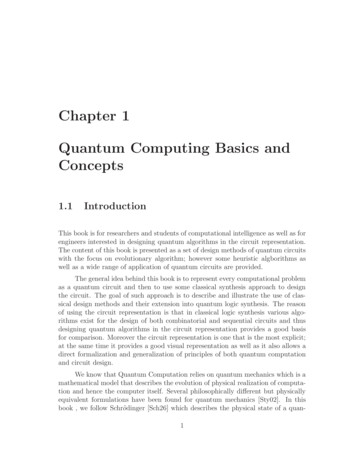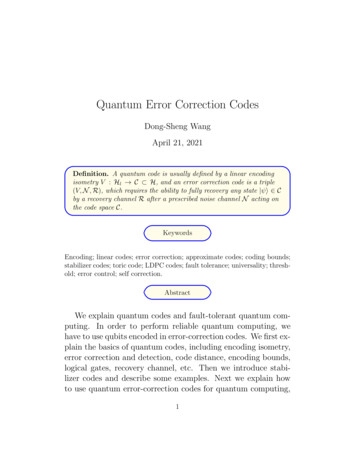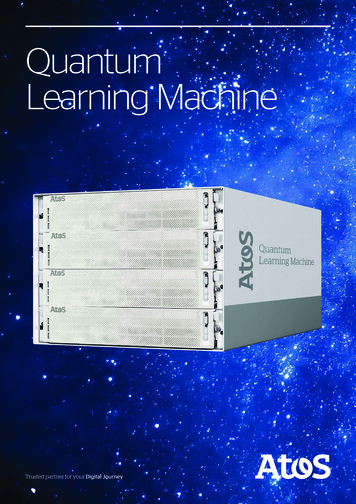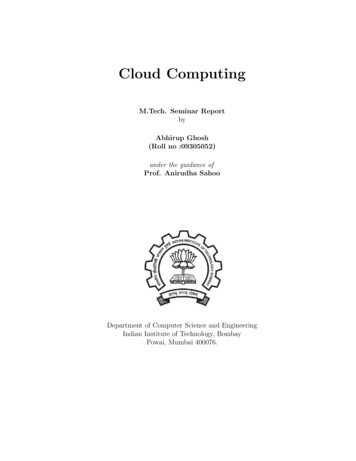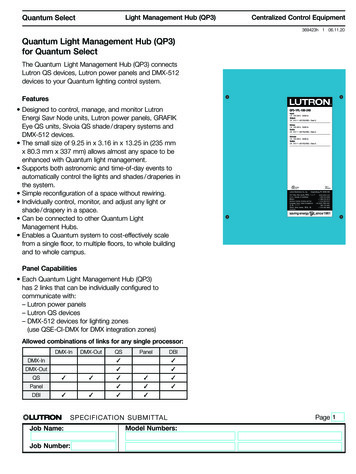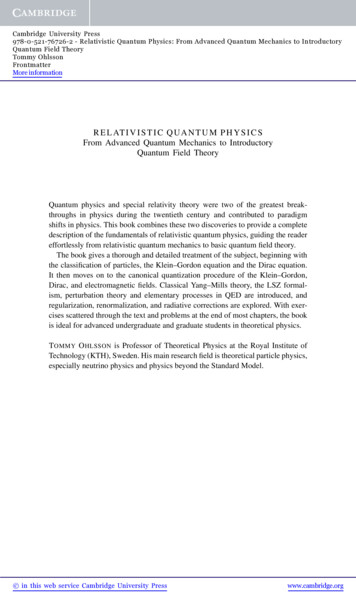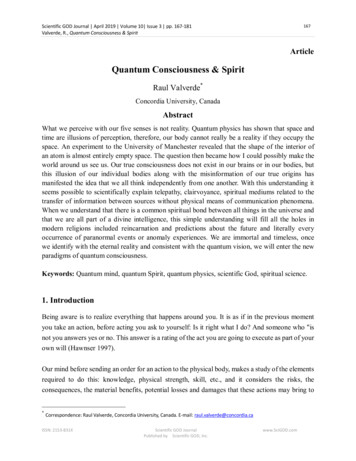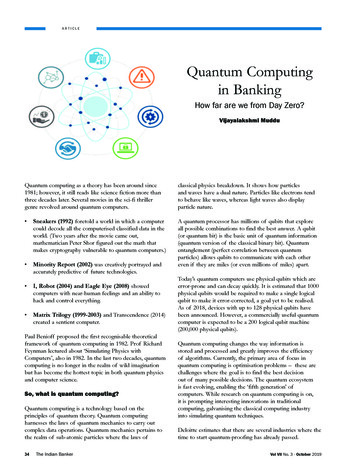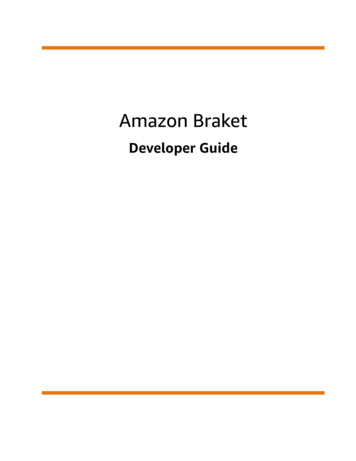
Transcription
White paperQuantum computingin financial services
There is no shortage of theoretical applications of quantum computing, ata grand scale, that approaches science fiction. How will it really affect thefinancial services industry? And how can you prepare? This paper looksinto several practical applications of quantum computing in financialservices and discusses the steps you can take today to prepare for thecoming revolution.Contents Quantum’s potential for the financial services industry3 The long, steady march toward quantum supremacy3 What quantum means for financial services3 Encryption and Cybersecurity The driver for innovations in financial services33 Preparing for a better future4 Create a quantum team4 Quantum development tools5 Application Readiness for Quantum5 Quantum Program A financially secure quantum future with Atos02Quantum computing in financial services67
Quantum’s potential for thefinancial services industryImagine being in two places at once,say, resolving a client’s toughest financialproblem while surfing in Hawaii or skiing inthe Alps. That’s more or less what quantumcomputing is about and why so manypeople are excited about it. In classicalcomputing, a bit can exist in one of twostates: 1 or 0. In quantum computing, aquantum bit (qubit) can exist in both states,simultaneously, which allows it to performmany calculations at once.Though quantum computing is in itsformative stages, scientists are eagerlyanticipating its ability to perform miraclessuch as eradicating diseases and unlockingthe mysteries of the universe. However,quantum computing needs to outperformclassical computing first. That ability isgenerally expected to require 50 qubits. Thequantum community refers to this goal asquantum supremacy.The long, steady march toward quantumsupremacyIBM unveiled a 50-qubit quantum computerin November 2017 with the ability to preservea quantum state for an industry record time:90 nanoseconds. After that it decoherers ordissipates like smoke. Qubits also require anoperating temperature of 10 MilliKelvin, nearabsolute zero.Even with these limitations, the industry isabuzz with excitement for the progress. Atthis rate, the business world will be able toharness quantum computing in 5-10 years.What does that mean for financial services?And how can we separate hype frompractical application?What quantum means for financialservicesThe driver for innovations in financialservicesEncryption and Cybersecurity“No one knows exactly at what scale andhow,” says Jerome Sandrini, Atos VP andHead of Big Data, North America. “But wedo know that quantum computing will bea strong driver for innovations in financialservices. It will most definitely revolutionizetrading, risk management and cybersecurity.We need to start preparing for this revolutionright now; this is why our Quantum LearningMachine (QLM) makes total sense fororganizations who want to understand howto leverage Quantum Computing and startdeveloping and testing software for it.Cryptocurrency, or bitcoin, is a currentinnovation that will be a target for quantumcomputing with its ability to break theunderlying security technology behindit. For instance, Frederik Kerling, BusinessConsultant and Senior Quantum Expert atAtos, says that crypto “breakings” can occurin the financial market through blockchainbreaking. Current encryption standards,therefore, will be particularly vulnerable toquantum attacks, which makes cybersecuritya critical aspect of quantum computing.Nearly all financial services companies havetwo known vulnerabilities in common: Reliance on legacy hardware Inability to change encryption standardsquicklyCybersecurity is one reason. Kerling says thebiggest impact on financial services will notbe the deployment of quantum computers.It will be preparing for the cyber criminals tohave quantum computers. However, it’s nottime to panic. None of this is real yet. Expertsagree that quantum vulnerabilities will becountered by quantum solutions.In addition to encryption and security,quantum computing will have an incredibleimpact, throughout the financial servicesindustry, from high-frequency trading toretail banking to insurance.High-frequency tradingTo picture the effects of quantum computingin financial services, look at high-frequencytrading (HFT). It’s hard not to. Computers andalgorithms can execute thousands of tradesper second. According to TABB Group, HFTaccounts for more than half of all trades.Many analysts and traders blame it forrecent unprecedented stock market volatility.Quantum computing will accelerate tradingfurther yet, and enhance it with artificialintelligence (AI) and predictive capabilities.Analytics-driven CRMIn retail banking and insurance alike,customer relationship management willbe improved by the automation of moretightly targeted services. Quantum canprovide greater accuracy in simulatingcustomer purchasing preferences basedon demographic data, whether that’s a newinsurance policy or mortgage. Customerpersonal information, meanwhile, canbe protected more effectively throughsimultaneous automation and analyticsof pending threats, anticipating andprescriptively responding to security attacks.Quantum computing in financial services03
Preparingfor a better futureMany organizations are patiently awaitingthe actual arrival of quantum and the optionsthat surround it. Others have learned fromthe evolution of classical computing: Thetime it takes to develop useful applications iswasted when the hardware is ready but youcan’t actually use it. With the revolution ofquantum computing, we have the advantageof being able to develop applications now,before the hardware is ready. And we knowmany areas that absolutely need attention.It’s already known that applications suchas portfolio optimization (e.g., MonteCarlo simulations) will be improved. Largebanks around the world are activelyinvesting in quantum computing researchand development specifically to driveimprovements to known applications such asMonte Carlo.“If you invest in quantum computing and youhave quantum computers of the right sizethen you know you can use it to improvethat kind of application,” says Kerling. “Buteveryone else already knows that, too. Ifeveryone is investing in it then it will be lesslike a secret weapon and more like requiredIT.”There are ways to prepare for the future inquantum computing and understand moreas we progress.Create a quantum teamAccording to Kerling, finding the rightpeople for a quantum team is the key tosuccess. You’ll need a couple of specializedmathematicians who fully understandquantum algorithms. They are rare, simplybecause it’s an emerging science. It’s evenharder to find them in the financial industry,so you’ll have to pull them out of academiawhere they learned their skills. They’ll be ableto educate others on your team.04Quantum computing in financial servicesYou also need python programmers or othercomputer engineers who are enthusiastic tolearn and experiment. To complete the team,recruit people with expertise in your areaof financial services. They’ll understand themarket well enough to know what’s worthresearching and what isn’t.Let them learnOne of today’s best advantages, for thosepreparing for quantum computing, is thestate of high-performance computing (HPC)and analytics. Atos is at the forefront ofboth these fields, with our leading HPC andsupercomputers as well as Atos Codex, ouradvanced analytics platform.Last year, we tapped into those strengthsto deliver the Atos Quantum LearningMachine (QLM), a quantum simulator thatallows researchers, engineers and studentsto develop and experiment with quantumsoftware. Rather than wait 5-10 years,organizations can start now to develop newapplications and test them for a Quantumworld.When you have the mathematical, businessand engineering mindsets together youcan start to develop quantum applications.Much can be accomplished with only two tofour people and a QLM. But the investmentdoesn’t need to be huge when you have theright team of people building experience anddeveloping applications for quantum.With the revolutionof quantumcomputing, we havethe advantage ofbeing able to developapplications now,before the hardwareis ready.
Quantum development toolsConsidering the multimillion-dollar price tag of the few, limited quantum computers available today, the most practical way to start developingand testing quantum applications is to use a simulator. Google, Microsoft and IBM offer simulators in the cloud. If you’re reluctant to shareyour data and algorithms on a public cloud then you’d be better served by a QLM in your own data center.QLM is a classical piece of hardware that simulates quantum computers up to 40 qubits, which until now was only possible withsupercomputers. It’s the size of an enterprise server that can be isolated on-premises. QLM can run several kinds of simulators, allowing youto develop applications that can run on different kinds of technologies.“If you just go to IBM, you’re going to get a superconductor. If you go to Microsoft, you’re just going to get something for the cloud. With QLM,you get all the technologies. So instead of worrying about which technology to invest in, you only have to focus on the application. We makesure that it runs on all technologies,” Kerling says.For less than 1 million, a QLM gives you a sandbox of general-purpose quantum computing programming that’s accessible 24x7 anddedicated to you.This is a relatively simple and cheap way to create an entire catalog of applications, tests and simulations. Build it up over 3-4 years and thenyou’ll be ready when the hardware catches up. The return on investment will be in the range of tenfold, as quantum becomes business readyand more pervasiveApplication Readiness for QuantumThe way you approach the future should be determined by the speed at which you need ROI. Quantum is still far away. However, Atos Codexrunning on Bull HPC platforms is the key to automation (AI) and business outcomes from data analytics and predictive models across theenterprise.Atos Codex helps financial services companies collect, integrate, manage and transform data to create business insights and outcomes inareas such as corporate finance, commercial and investment banking, financial planning, insurance, and public accounting. By using AtosCodex, in these areas, you can start preparing for a Quantum application future:Raw tum computing in financial services05
What we can do today to prepare for a Quantum WorldQuantum risk assessmentsWe can help you leverage your quantum based future by conducting a quantum riskassessment now.Quantum computing is incredibly complicated, yet the fundamental security threats havenot changed. The challenge is a lack of insight into quantum-attack vulnerabilities within anorganization, because encryption is often embedded into hardware and software. A quantumrisk assessment discovers where these vulnerabilities are, their likelihood and impact, and thetimeline in which this will unfold.These risk assessments are an extension of our Quantum Program, which is guided by aScientific Council of world-renowned quantum physicists and mathematicians.Their work in quantum computing and quantum-safe cryptography allows us to identifyemerging threat actors and spot them in your organization.At the conclusion of a risk assessment, you’ll have: Impact and likelihood analysis Vulnerability prioritization and next steps Timeline and critical period indication06Quantum computing in financial servicesThe Quantum Program ScientificCouncil joined forces in late 2016to accelerate quantum computingsolutions and algorithmic standards.Progress after its first year includes: Launching the QLM and deliveringit 6 months later to Oak RidgeNational Laboratory, the U.S.Department of Energy’s largestmulti-program science and energylaboratory Simulating physical qubits moreefficiently by integrating a “quantumnoise” model that improvesresearch on qubit architectures Developing quantum-safealgorithm standards toanticipate future critical needs incybersecurity
A financially securequantum future with AtosThe next 10 years will be completelytransformed through quantum computingand that’s especially true for the financialservices industry so why not start now?Atos has the team of quantum experts youneed to ensure cybersecurity and prepareyou for the exciting innovations thatquantum computing is sure to deliver.Atos is a recognized leader in data andanalytics, helping financial servicescompanies around the world createcustomer-centric business modelssupported by data and emergingtechnologies. We are committed todeveloping innovative HPC systems andsolutions to solve the major challengesof the 21st century. Beyond Bull systemdesign and delivery, we offer completeprofessional services to design, install,operate, manage and continuously improveHPC infrastructures. A leader in quantumcomputing research, our QuantumLearning Machine (QLM) is the highestperforming quantum simulator nfo.na@atos.netAbout the AuthorsJerome SandriniVP and Head of Big Data for Atos North AmericaJerome is the expert for Big Data and HPC platforms, Advanced Analytics, DataScience and Machine Learning. He successfully led the deployment of the AtosQuantum Learning Machine in the North American Market. He collaborates withQuantum teams from national research laboratories and with companies anticipatingthe upcoming Quantum revolution. Jerome has an engineering background inDistributed Computing systems and software development, as well as a strongentrepreneurial profile. In 2004, he founded FastConnect, a consulting company inFrance with over 150 employees specializing in Big Data architectures and applicationcloud enablement. FastConnect was ultimately acquired by Atos in 2013. Jeromerelocated to New York in 2016 to create and grow the Big Data practice and bring Atosinnovations in Big Data and Analytics to Atos’ North American customers.Frederik KerlingSenior Quantum Expert, and member of the Scientific CommunityFrederik Kerling is a Senior Quantum Expert heading the quantum consulting teambased in the Netherlands. He is also a member and an editorial board member ofthe Atos Scientific Community. As a theoretical physicist specializing in Quantumengineering he made the transition to consulting after his time in Copenhagen. Heis internationally active within the quantum community, and collaborates in severalconsortia and initiatives to promote quantum technology. In addition he developspatents in quantum technology, and is always open for a good discussion aboutquantum fundamentals. Frederik is often employed in innovation tracks in the role ofinnovation manager or even determining innovation strategies on a corporate level.And in his spare time can be found exercising, gaming, teaching and doing improv.Quantum computing in financial services07
About AtosAtos is a global leader in digitaltransformation with approximately 100,000employees in 73 countries and annualrevenue of around 13 billion. Europeannumber one in Big Data, Cybersecurity,High Performance Computing and DigitalWorkplace, the Group provides Cloudservices, Infrastructure & Data Management,Business & Platform solutions, as well astransactional services through Worldline, theEuropean leader in the payment industry.With its cutting-edge technologies, digitalexpertise and industry knowledge, Atossupports the digital transformation of itsclients across various business sectors:Defense, Financial Services, Health,Manufacturing, Media, Energy & Utilities,Public sector, Retail, Telecommunications andTransportation. The Group is the WorldwideInformation Technology Partner for theOlympic & Paralympic Games and operatesunder the brands Atos, Atos Consulting, AtosWorldgrid, Bull, Canopy, Unify and Worldline.Atos SE (Societas Europaea) is listed on theCAC40 Paris stock index.Find out more about usna.atos.netLet’s start a discussion togetherFor more information: info.na@atos.netAll trademarks are the property of their respective owners. Atos, the Atos logo, Atos Codex, Atos Consulting, Atos Worldgrid, Bull, Canopy,equensWorldline, Unify, Worldline and Zero Email are registered trademarks of the Atos group. Atos reserves the right to modify this documentat any time without notice. Some offerings or parts of offerings described in this document may not be available locally. Please contact yourlocal Atos office for information regarding the offerings available in your country. This document does not represent a contractual commitment.May 2018. 2018 Atos
"No one knows exactly at what scale and how," says Jerome Sandrini, Atos VP and Head of Big Data, North America. "But we do know that quantum computing will be a strong driver for innovations in financial services. It will most definitely revolutionize trading, risk management and cybersecurity. We need to start preparing for this revolution
